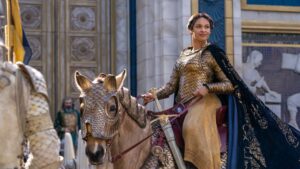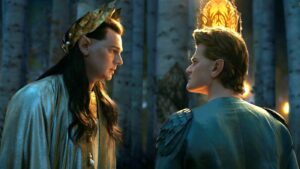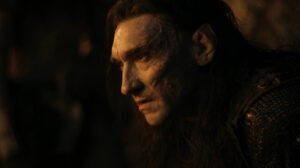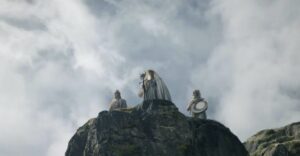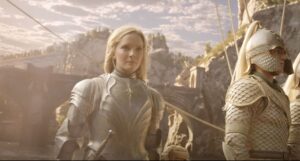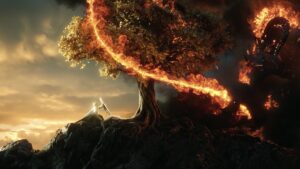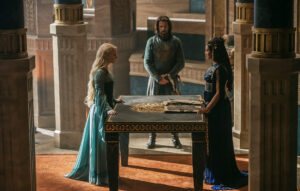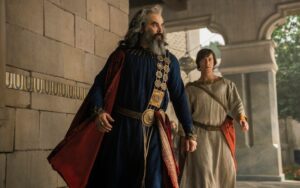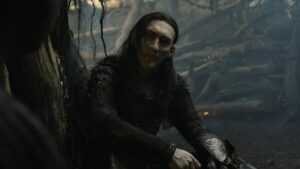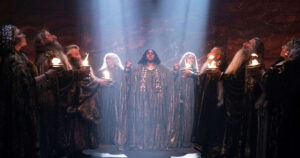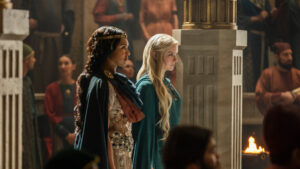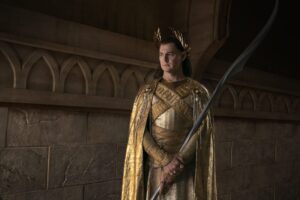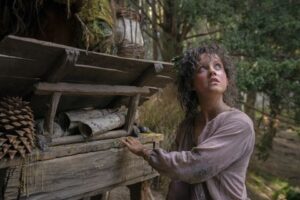MAJOR SPOILERS FOR THE RINGS OF POWER EPISODE SEVEN AHEAD!
“‘I shan’t call it the end, till we’ve cleared up the mess,’ said Sam gloomily. ‘And that’ll take a lot of time and work.'”
– The Lord Of The Rings: The Return Of The King, The Scouring Of The Shire, p. 1020
A very good episode in and of itself, but poorly-suited for its crucial spot towards the end of season one, “The Eye” will, I think, be remembered unfavorably by fans for failing to deliver on the promise Amazon made with that arresting title and their marketing, that this would be the episode where the Dark Lord Sauron’s identity would be revealed outright, to the audience if not to the characters. Whether you feel that’s entirely on fans for allowing themselves to be so easily deceived, there’s no denying that episode seven is surprisingly slow and uneventful for the penultimate episode of a season that has been widely criticized for taking too long to get wherever it’s going (and until now I’ve been on the opposing side, saying the season has moved much too quickly for its own good, but this episode is almost as slow as an Entish good-morning).
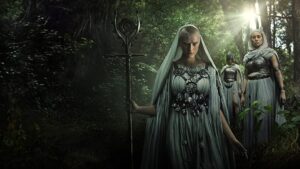
This episode brought to mind something that I’ve heard said about Peter Jackson’s The Return Of The King frequently over the years, namely that the film has too many false endings where it feels like the story has been satisfyingly wrapped up but after a fade-to-black it’s revealed that that’s not the case and instead it just keeps going, and going, and going – it’s a critique I hear a lot from casual fans, who don’t realize that Jackson was heavily abbreviating the last few chapters of the book: which follows the Fellowship on their homeward journey north from Minas Tirith after the War of the Ring, with stops every couple of paragraphs at Edoras, Helm’s Deep, Isengard, Rivendell, Weathertop and Bree, all before the four Hobbits make it back to the Shire, where they discover Saruman has installed himself as “Chief” in Bag-end and has hired mercenaries to oppress the Hobbits.
None of that makes it into the Extended Edition of Jackson’s Return Of The King, much less the Theatrical Version with which most casual fans are probably familiar, and yet even the swift transition from Frodo reuniting with his friends in Minas Tirith directly to the coronation of Aragorn and thence to the Shire is enough to bore some viewers to tears – and while I can’t say I ever felt bored watching The Rings Of Power‘s seventh episode (unlike the Elves, I have not yet grown weary of Middle-earth and likely never will in my lifetime), I think I finally understand where those critiques are come from, at least to an extent…though I still don’t agree that The Scouring Of The Shire “needed” to be cut entirely, and The Eye works for me precisely because it explores several of the same themes as that chapter. Slow pacing and a few too many false endings aside, it actually does so rather well.
The first few minutes of the episode, packed with high-stakes action as the survivors of Orodruin’s eruption stagger blindly through the burning wreckage of Tirharad, dragging their wounded friends and loved ones with them, give no indication that the episode will soon grind to a halt as subplots collide, characters reel and take time to recover, and a lot of subtle internal development occurs as a result, especially to Galadriel (Morfydd Clark). The Noldorin Elf, born in Valinor before the first sunrise, is paired up with Theo (Tyroe Muhafidin), a fourteen-year old mortal boy stunned into silence by the sheer scale of the devastation unfolding around him, devastation he unwittingly helped to bring about and at the time believed worth it for his mother. These two, companions by chance, learn valuable lessons from each other that will shape them both moving forward.
In Theo, Galadriel sees another version of herself rising from the ashes of Tirharad – another dangerously naïve child with fire in their heart and behind their eyes, whose instinctive response to trauma is to exact vengeance on those they’ve determined to be responsible. Galadriel, though not a child in years when her older brother Finrod was killed by Sauron and his mission became hers, was still childish and impulsive, like most of her family (sadly, in The Rings Of Power, Galadriel’s family consists strictly of her brother Finrod and father Finarfin because Amazon can’t legally mention anybody else). She hoped, as a child might, that when Sauron was gone, her heart would be healed, and instead she spent over a thousand years pursuing him across Middle-earth without success, while alienating everyone she cared about (possibly including her husband, Celeborn).
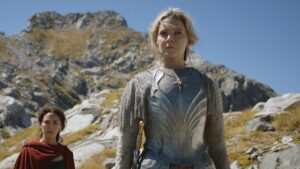
Following Finrod’s death, Galadriel had no one to advise her against making the worst decision of her life…at least in The Rings Of Power‘s abridged version of events, where no mention is made of her mentor in sorcery, Melian the Maia, and where Galadriel’s husband Celeborn is said to have never returned home from the wars against Morgoth, which to her implies that he perished although I have a feeling only she and very casual fans of the franchise will be shocked when he inevitably returns in a future season. Anyway, this time around, someone is there for Theo, someone to help guide that frightened child back from the brink of bitterness, anger, and despair, instilling in him the self-control she was never taught when she was young – and that person is Galadriel, of course.
As they meander slowly (too slowly) through the burned and blackened remains of the Southlands, Theo is driven almost to his breaking-point by his grief and guilt – but Galadriel keeps him from falling apart with gentle words of encouragement, urging him not to justify evil deeds to himself as she did. The sense I get from all their interactions is that, much like how in The Lord Of The Rings Frodo clung to the notion that if he could save Gollum there might still be hope for him in the long run, Galadriel needs to know that Theo can be saved for her to feel she too can be. But if Theo is the person Galadriel was meant to cross paths with all along, as I now suspect, where does that leave Halbrand (Charlie Vickers), who has only ever sated Galadriel’s appetite for blood by feeding her the information she wants to hear?
With Halbrand, newly crowned King of the Southlands, vanishing after the eruption of Orodruin only to wind up so badly injured that Galadriel takes it upon herself to urgently shuttle him out of the Southlands – and away from all his new responsibilities – to Lindon for the kind of healing only Elves can provide), the case for him being Sauron in disguise has never been stronger. I mean, assuming all goes according to plan, he’ll literally be delivered to Gil-galad and Celebrimbor as if on a silver platter. But the truth of the matter is a well-kept secret over at Amazon Prime Studios, at least for a day longer (meanwhile, House Of The Dragon‘s plot is available to read in its entirety on Reddit and full episodes leak in advance of their release every week).
I myself have oscillated between suspecting Halbrand and wanting only the best for him. Frankly, I don’t see how all his actions throughout the first season will retroactively add up if he turns out to be Sauron. He was downright insistent about staying in Númenor from the moment he set foot there, but then he was insistent about staying in the Southlands with his subjects – and since on both occasions it was Galadriel who ultimately coerced him into following her, the only way I can rationalize this is if Sauron is legitimately trying to do good everywhere Galadriel brings him, thinking she is his salvation the way she was for Theo, yet by a cruel twist of fate Galadriel is preventing that from happening by leading him closer and closer to his long-suppressed ultimate goal, the kingdoms of the Elves.
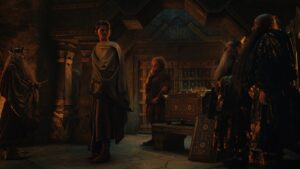
The emphasis placed on Halbrand’s skill as a smith leads me to believe that, whether he is Sauron or not, he will play a key role in the creation of the Rings of Power – perhaps, if he is just some guy from the Southlands trying to do good, he will contend with the real Sauron for influence over the project only to be corrupted and then later gifted one of the Nine Rings for mortal Men as a reward for his assistance. But if he is Sauron, I only pray that he poses as an Elf while dealing with Celebrimbor – Elven arrogance is one of the main ingredients in the Rings of Power, and I can’t easily envision Celebrimbor taking advice on this subject from a Man he deems inferior to himself in every way. It was hard enough getting him to work with Dwarves.
Regardless of whether Galadriel is literally accompanying the chief enemy of her people back to Lindon, the volatile situation she’ll find when she returns is practically ready and waiting to be manipulated by the Dark Lord, much like how Orodruin was waiting for a single catalyst to cause a chain-reaction of catastrophic events leading directly to the volcano’s eruption. Riled up by rumors and scant evidence that the light of the immortal Elves is fast fading and only mithril can prevent their decay (which to them is the closest equivalent to death), King Gil-galad and Celebrimbor are plotting to take decisive action, which sounds to me like someone is about to forge a prototype Ring of Power.
As much as I strongly dislike The Rings Of Power‘s take on Gil-galad as a patronizing middle-aged guy, I appreciate that the writers are implicating him in the creation of the Rings – because it always bothered me when reading The Silmarillion‘s account of the Second Age that Gil-galad saw straight through Sauron’s disguise, knew he was trouble, and even forbade him entry into Lindon, yet allowed him to stay in Eregion for centuries, all while Galadriel was going around telling anybody who would listen that Sauron was most definitely back. In The Rings Of Power, I would not be surprised if Gil-galad refuses to act because he wants Celebrimbor and Sauron to finish the Rings first, and it doesn’t matter to him if Celebrimbor gets hurt or killed because he was a Fëanorian and Gil-galad can always have the historical record edited to show that he warned Celebrimbor about Sauron.
Elrond (Robert Aramayo), Gil-galad’s young herald, is also said to have advised the High King against permitting Sauron into Lindon, but in The Rings Of Power thus far he’s only returned to Lindon once since leaving with Celebrimbor in episode one, and has spent most of his screentime haranguing the Dwarves of Khazad-dûm in the hopes that they’ll share their mithril with the Elves. He really is becoming a politician, as Galadriel once observed with some scorn in her voice that I now think was not unwarranted: apart from missing several important events in his friend Durin IV (Owain Arthur)’s life, including his wedding and the births of his children, Elrond has lied to Durin and the Dwarves on numerous occasions, or bent the truth where it behooves him to do so.
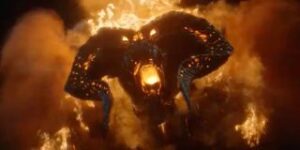
In this very episode, Elrond even admits as much to his friend, telling Durin that he intentionally threw the rock-breaking contest in episode two so that he could speak to the Dwarf (which kinda makes sense; if he had won, Durin would have been publicly humiliated and never would have heard him out). Durin laughs it off, but he doesn’t seem to realize that Elrond is manipulating him – and to be fair to Elrond, I don’t think he fully realizes it either. He just wants to make his mark on Middle-earth independent from Gil-galad, and he thought defying the High King’s will would be enough, but he’s still using the tools of Gil-galad’s trade to get what he wants. Only by discarding those tools and employing the unbiased empathy unique to him will Elrond finally evolve into the character we know from The Lord Of The Rings.
Unfortunately, it’s much too late for him to repair Durin IV’s relationship with his father, Durin III (Peter Mullan), which was already strained before Elrond entered the picture but broke at last under additional pressure from the Elf. Durin III is absolutely at fault for stifling his son’s ambitions and refusing to so much as entertain any of his suggestions, but he’s also weirdly not wrong for distrusting Elrond, believing the Elves should accept mortality as all others in the world must, not wanting to challenge the will of Eru Ilúvatar on that subject in particular (see: Akallabêth), and above all else not wishing to endanger Khazad-dûm and its people by digging for mithril beneath the city. At the same time, Durin IV isn’t wrong for wanting to help his friend or for feeling immense guilt and shame when his father intervenes on his behalf, but the Dwarves wouldn’t advise against digging too deeply if they didn’t have reason to believe there was something down there, something bad.
As we discover near the end of the episode, there is something bad down there, a Balrog of Morgoth to be precise, and if all it takes is a single falling leaf for this thing to wake enraged from its slumber and roar, imagine for a moment what the ceaseless sound of picks and hammers just above its head will do to it. Unless there’s a whole colony of Balrogs hiding out beneath the Misty Mountains, I’m inclined to say this is the very same Balrog that will in a future Age arise from the darkness to slaughter the Dwarves of Khazad-dûm; the same Balrog that made a brief but memorable appearance in The Fellowship Of The Ring, where it killed Gandalf the Grey and was killed by him; and the same Balrog described in the non-canonical Song Of The Roots Of Hithaeglir, though no mention was made of it falling into the Misty Mountains.
But these are events in the far-off future and past, respectively, and right here and now this Balrog serves no real purpose except as foreshadowing and fan-service. In the season finale I might have excused it, if it were one of many little teases to get people hyped for season two, but in the penultimate episode of the first season it’s totally misplaced. It’s definitely not getting brought up again before the season’s end, I can assure you of that, and frankly I’m not even sure we’ll see the Dwarves again, unless it’s part of some closing montage wrapping up all the subplots. But what is there to wrap up? Durin III is old and obstinate, and I don’t see him changing his mind for the sake of any Elf in Middle-earth, so all that’s left for him is to die or be defied. I’ll confess to being somewhat morbidly curious at the thought of a Dynasty-style, cutthroat Dwarven family soap opera, but even Durin IV’s ambitious wife, Disa (Sophia Nomvete), advises her husband to simply wait for his father to pass on before making his next move.
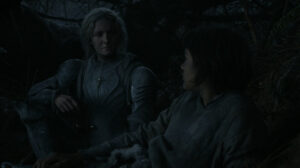
Another major character I’m not sure we’ll see again in what little remains of this first season is Theo, who parts ways with Galadriel after reuniting with his mother Bronwyn (Nazanin Boniadi) and her Elven boyfriend Arondir (Ismael Cruz Córdova). The last we see of this lovely trio, they’re leading the Southlanders even further south-west to Pelargir near the mouth of the River Anduin (prediction: Arondir gets nostalgic for Beleriand and its great river, and begins to experience Sea-longing, a sign that the Elves are indeed fading). The city of Pelargir was canonically established after the forging of the Rings by Númenórean colonizers, but in The Rings Of Power it’s described as one of their ancient outposts, which implies that Númenor had an empire once, before they became a nation of isolationists, which indirectly (and probably unintentionally) implies that it’s only once they stopped colonizing Middle-earth that they fell out of favor with the gods…am I interpreting that correctly?
A number of controversial yet potentially very interesting choices were made with the Númenórean characters in this episode – Isildur (Maxim Baldry), separated from his friends in the chaos following Orodruin’s eruption, is set up to have a solo arc in Middle-earth next season, perhaps allowing him to lay the groundwork for the kingdom of Gondor (and interact with Theo, who I believe is destined to become King of the Dead); his father Elendil (Lloyd Owen)’s faith in the Elves is shaken by the apparent death of his son, which will make the future alliance between him and Gil-galad all the more emotionally impactful; and most notably, Tar-Míriel (Cynthia Addai-Robinson), the Queen-Regent of Númenor, is blinded by flying sparks.
The consequences of this choice are not immediately clear to me, and though I’ve seen speculation that Míriel’s disability will provide her chancellor Pharazôn with the only excuse he needs to take on more responsibilities in the governance of Númenor, if this is to be the case I hope it’s handled very carefully by the writers – there are a dozen routes Míriel’s storyline could take that would veer into ableist territory, and I worry that, given her ultimate fate, it’s rather callous to make her of all characters Middle-earth’s first and (off the top of my head) only blind character. But if, Eru forbid, Míriel is ever reduced to a Victim archetype, I trust that will not be the fault of Addai-Robinson; she seems to understand the importance of finding an authentic balance between vulnerability and strength, and the fact that these were the very first scenes she filmed, before she even knew the character, is pretty remarkable.
But with all the chaos and drama unfolding in the Southlands on this week’s episode, I’m sure I was not alone in feeling tonal whiplash when director Charlotte Brändström cut away from Isildur being buried under a burning house and Tar-Míriel screaming while clutching at her eyes to Poppy Proudfellow (Megan Richards) singing about snails. The Harfoot subplot initially comes across as deliberately interruptive, as if it was meant to give viewers a quick breather before plunging back into the smog blanketing the Southlands – and seeing as The Stranger (Daniel Weyman) and Elanor Brandyfoot (Markella Kavenagh) basically just retread the same ground we covered in episode five (with Stranger once again performing magic that goes awry and scares the Harfoots), that may well be the case. It’s not until the Stranger leaves to be on his own, and the Mystics come looking for him, that things get really interesting.
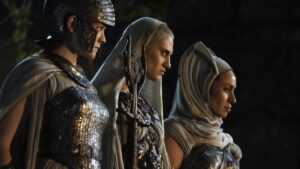
The Mystics, a harmonious trio of tall, gaunt, eerily-silent, wispy women who go by the titles Dweller (Bridie Sisson), Nomad (Edith Poor), and Ascetic (Kali Kopae), made only a small impression on me when they were introduced in episode five, but this week we saw them in action – and sure, maybe it’s just from the perspective of the diminutive Harfoots that they’re absolutely terrifying, but they can practice dark magic, which to my mind already implies that they’re on roughly the same power-level as the Stranger in his current state. Additionally, Middle-earth’s magic-system relies heavily on staffs or staves, and you’ll notice that at all times one of the Mystics is carrying a black scepter crowned with the symbol of the Lidless Eye – a bit like how, in Greek mythology, the three Grey Sisters share a single eye. I believe that’s why their magic works, and the Stranger’s doesn’t…yet.
But before the end of the season, I predict that the Stranger will wrest that black scepter away from the Dweller (who most often appears to be in charge of carrying it around) and using it for the first time will cause him to radically transform, for better or worse, into a completely different person. At the very least, I hope then we’ll be able to confirm what class of being he belongs to, and if Amazon is feeling especially generous they’ll share his name with all of us. On that note, keep in mind that even if he turns out to be Gandalf, he’s unlikely to refer to himself by that “Mannish” name – instead, the Quenya Elvish name he would presumably be using upon his arrival in Middle-earth is Olórin. Likewise, if he’s a Blue Wizard, keep your ears pricked for the names Alatar, Pallando, Morinehtar, or Rómestámo.
Some fans still think the Stranger’s identity won’t be revealed this season, and I think that’s absurd now that we know he and the Harfoots will return in the finale (what do they have left to do this season, if not get to the bottom of this lingering mystery from episode one?), but given how many subplots seemed to just end this week I honestly wouldn’t have been surprised if neither he nor the Harfoots reappeared. I think that’s why this episode feels so slow, because it’s wrapping up most of the really engaging subplots a little earlier than anticipated while apparently shifting focus over to the one that never picked up steam, and to characters like Gil-galad and Celebrimbor who only got a few minutes of screentime in total. The finale needs to sell us on that subplot, or going into season two many casual fans will be more hyped to see the return of original characters than the forging of the Rings of Power, and that would be a shame.
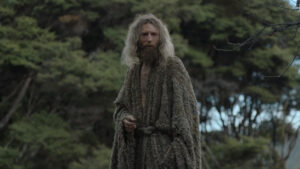
I won’t lie, going into the season finale with no clear idea of how, when, where, or even if Sauron will be revealed is kinda nerve-wracking for this fan who’s been waiting to see him in his full glory for a very long time now – but I have no doubt that, each week, regardless of whether my expectations are always matched or surpassed, The Rings Of Power will continue to take me on a thrilling journey with every new episode. I only wish it didn’t have to end so soon. It feels like just yesterday I was sitting in a movie-theater, staring up in awe (and I mean straight up: me and my sister were seated in the literal front row) at locations and characters from these books I adore that I’ve never before had a chance to see onscreen, with Bear McCreary’s score echoing in the room all around me, surrounded by people presumably just as eager to see what J.D. Payne and Patrick McKay had to offer in the first two episodes screened for fans. Maybe that’s the upside to false endings: they allow us to spend a few more precious moments in this world we love before finishing the story.
Episode Rating: 7.5/10
